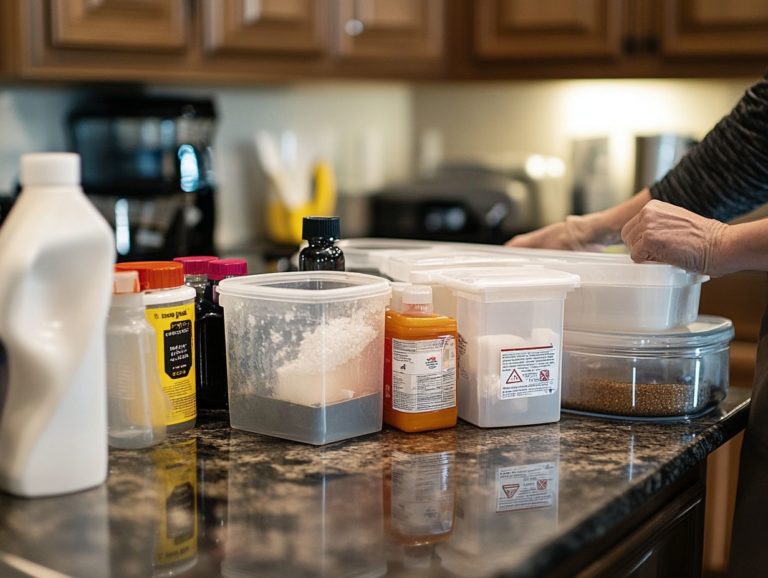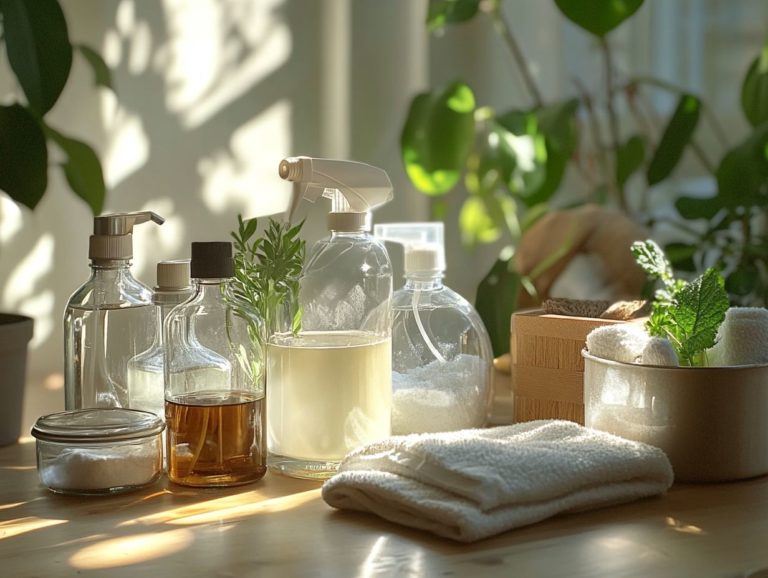What Should I Know About Scent Safety?
Scents have a strong effect on your daily life, influencing your moods, memories, and overall well-being, as well as affecting reactions to many chemicals.
While they can evoke delightful feelings, it s important to understand the various dimensions of scents, including their types, effects, and potential risks. This includes understanding regulations for fragrance safety and how they can affect individuals with sensitivities.
We will explore how scents affect your body. You will learn about safety implications, the chemistry behind them, and how to choose the right fragrances for yourself.
You ll uncover best practices for using scents safely and appreciate the value of natural options. You will also learn about the regulations that govern scented products, such as a set of rules for fragrance safety known as IFRA standards.
Join us as we discover the amazing world of scents, ensuring you have a safe and enjoyable aromatic experience while maintaining wellness and air quality standards.
Contents
Key Takeaways:

- Know the risks of scents like allergies, migraines, hormone disruption, toxicity, and multiple chemical sensitivity (MCS).
- Use scents safely by following guidelines, choosing natural alternatives to synthetic scents, ensuring proper ventilation, and reducing exposure to harmful chemicals.
- When purchasing scented products, look for ingredients, certifications, and labeling that indicate safety. Avoid products with restricted scents to ensure compliance with IFRA standards.
What Are Scents?
So, what exactly are scents? Scents are aromatic substances that can either be naturally derived or synthetically created. You ll find them in many products, from perfumes to cleaners and essential oils, all designed to create nice spaces, enhance well-being, and even sway consumer behavior. They play a significant role in consumer choices and occupational settings, where air quality and fragrance-free policies are crucial.
In today s marketplace, scents are pivotal in shaping the consumer experience, especially in environments like the workplace. The right scent can significantly impact air quality, mood, and overall health. Proper environmental assessments and the implementation of scent-free policies can enhance workplace comfort and productivity.
While essential oils often receive accolades for their therapeutic benefits, non-essential oils and synthetic fragrances can raise concerns about safety and chemical exposure. Understanding the chemistry and potential adverse health issues related to these products is essential for safe consumption.
How Do Scents Affect Us?
Scents wield a remarkable influence over you, shaping your emotions, evoking memories, and even triggering physiological responses. The psychology of fragrance indicates that delightful aromas can elevate your mood, enhance communication, and cultivate a welcome environment, often resulting in smiles and positive interactions among individuals.
This is especially true in the workplace, where the right scent can significantly boost your productivity and overall well-being. However, understanding how different scents affect you requires a thoughtful exploration of both the positive and negative health implications tied to exposure to various fragrances and chemicals. It’s important to implement scent-free policies and ensure proper ventilation to mitigate adverse reactions.
Start exploring scents safely today!
What Are The Different Types Of Scents?
Discover a fascinating array of scents. They can be categorized into essential oils, non-essential oils, synthetic fragrances, and natural aromas. Each type boasts unique properties and applications.
Essential oils, extracted through methods like steam distillation and cold pressing, offer a wealth of health benefits. Steam distillation uses steam to extract essential oils, while cold pressing extracts oils from plant peels without heat. Imagine experiencing stress relief, improved sleep, and an enhanced mood, all thanks to their potent natural compounds.
In contrast, non-essential oils, typically derived from heavier carrier oils, serve as excellent bases for relaxation and massage. However, these oils don t carry the same therapeutic qualities as essential oils. Proper testing and labeling ensure safety and efficacy.
Synthetic fragrances, often found in mass-produced products, can deliver delightful aromas. However, they may raise health safety concerns, particularly for those sensitive to allergens or chemicals. By exploring these scent categories and staying informed about their ingredients and environmental impact, you can make choices that align with your health and environmental preferences.
What Are The Potential Risks Of Scents?
While scents can elevate your environment and well-being, recognizing potential risks is crucial, especially regarding health and safety.
Many fragrances are composed of chemicals that may provoke allergic reactions, worsen conditions like asthma, or even contribute to multiple chemical sensitivity, a condition where individuals have adverse reactions to various chemicals, and other environmental sensitivities in vulnerable individuals.
Being aware of the implications tied to various scents underscores the necessity of consumer education about the ingredients found in fragrance products. It s crucial to make informed choices that prioritize personal health and safety, considering factors like environmental impact and adherence to health regulations.
Can Scents Cause Allergic Reactions?
Yes, scents can trigger allergic reactions, and it s vital to be aware of this. Specific chemicals or compounds found in fragrances may cause issues. If you have sensitivities, you might experience skin irritation, respiratory issues, or other unpleasant health effects when exposed to certain scents, particularly those derived from synthetic sources.
Recognizing the role of these chemicals and the value of fragrance-free environments is essential for maintaining health and well-being, especially if you have underlying health conditions or sensitivities. Proper environmental assessments and air quality testing can aid in creating a safe living space.
The intricacy of fragrances often stems from their formulation, which can include allergens like formaldehyde, phthalates, and various essential oils that may provoke a reaction. Everyday products like perfumes, air fresheners, and scented lotions can harbor a mixture of these irritants, often catching users off guard regarding their potential impact.
Understanding the chemistry behind these products can help mitigate adverse reactions and promote safer consumption. That s why it’s crucial to educate yourself about the ingredients in these products and to be aware of your sensitivities. Stay informed to enhance your quality of life today.
Can Scents Trigger Migraines?

Scents can trigger migraines for some people, particularly those with sensitivities to certain fragrances or chemicals. Research indicates that strong odors, especially synthetic ones, often serve as migraine triggers.
This can result in severe headaches and discomfort. If you experience migraine attacks, it may be wise to steer clear of heavily scented products and opt for fragrance-free alternatives to prioritize your health and well-being.
Common fragrances, such as perfume, air fresheners, and scented candles, frequently come up as migraine triggers among many sufferers. Even natural scents, like potent floral or citrus notes, can lead to uncomfortable sensations or full-blown migraine episodes.
Consulting with health advisors can provide valuable insights into managing these triggers. It s crucial for anyone prone to migraines to identify and track their specific triggers, as these can vary significantly from person to person.
By creating a migraine-friendly environment reducing exposure to troublesome scents, using essential oil diffusers with caution, and selecting personal care items with neutral fragrances you can enhance your daily comfort and decrease the likelihood of migraine episodes. Occupational considerations and environmental controls can further aid in minimizing adverse health issues in sensitive individuals.
Can Scents Affect Our Hormones?
Certain scents, along with the chemicals they harbor, can indeed influence your hormones, leading to potential disruptions in endocrine functions. Research has shown that some synthetic fragrances contain substances that can interfere with hormone function, which can disrupt your hormonal balance and overall well-being.
It’s important to carefully examine the ingredients in scented products and opt for safer, natural alternatives whenever possible. Ensuring compliance with health regulations and conducting proper testing can mitigate these risks.
Take phthalates, for example. Often used to extend fragrance longevity, they’ve been linked to various health issues, including fertility problems and developmental disorders. Additionally, compounds like parabens and synthetic musks frequently lurk in perfumes and air fresheners, raising alarms due to their potential to mimic estrogen and disrupt hormone levels.
Prioritizing products with safe ingredients and adhering to regulatory standards are key to safeguarding your health. By paying attention to what’s in your personal care products, you can take proactive steps toward maintaining your hormonal health.
Choosing fragrances derived from natural sources, such as essential oils, allows you to significantly reduce your exposure to these harmful chemicals while still enjoying the delightful benefits of scent.
Can Scents Be Toxic?
Certain scents can indeed be toxic due to the harmful chemicals often lurking in synthetic fragrances. When you’re exposed to these substances, you might face a range of health issues, from respiratory problems to skin irritation, and even more serious long-term effects. Proper testing and adherence to health standards are crucial in preventing such adverse outcomes.
As you become increasingly aware of the potential dangers tied to scented products, it s crucial to prioritize your safety by choosing items that adhere to health regulations and standards. Environmental and occupational considerations should also guide your choices to ensure a safer environment.
Being aware of these issues means we need manufacturers to be transparent about their ingredients. It’s easy to assume that all scents are safe simply because they’re available on store shelves, but that misconception can be quite dangerous.
Act now to educate yourself on identifying safe products and decode labeling. Advocating for stricter regulations on synthetic fragrances can significantly contribute to a safer environment for everyone, highlighting the importance of a more conscientious approach to your consumer habits.
This involves ongoing education about scent safety and environmental impact.
How To Use Scents Safely?
Using scents safely requires you to grasp the nuances of proper application and dosage to minimize potential health risks while fully enjoying their benefits. It’s crucial for you to be aware of your sensitivities and select scents that align with your individual health needs. Adhering to safety policies can further ensure your well-being.
To elevate your scent experience, consider best practices such as:
- Ensure proper ventilation in the spaces where you apply fragrances,
- Favor natural essential oils over synthetic alternatives,
- Take the time to educate yourself about the ingredients in the products you choose.
What Are The Recommended Dosages Of Scents?
Recommended dosages of scents can vary significantly based on the type of product and your individual sensitivity. It’s wise to start with lower concentrations and gradually increase as needed. For essential oils, for example, using them in moderation is key; diluting them with a carrier oil (like coconut oil) can help prevent negative reactions. Understanding your personal tolerance levels is essential for ensuring safe exposure to various scents. Remember, consumers should be informed about the safe usage of these products.
In terms of synthetic fragrances, it s beneficial to pay attention to both concentration and application method. Typically, just a few drops can effectively scent a room, while body lotions containing fragrance should be applied sparingly, since your skin can absorb these chemicals differently.
It’s crucial to observe how you react to different scents, as some individuals may experience allergies or sensitivities that require a lower dosage. Keeping a log of how various scents are received can help you pinpoint the ideal levels of exposure.
Ultimately, the key is striking a balance between enjoyment and safety, allowing your personal preferences to guide your scent usage.
What Are The Best Practices For Using Scents?
When using scents safely, keep in mind several best practices, including proper ventilation, mindful application, and awareness of any personal sensitivities you or those around you might have. Make sure your space is well-ventilated to significantly reduce the risk of adverse health effects while enhancing your overall aromatic experience.
By selecting high-quality, natural scents and adhering to recommended usage guidelines, you can create a healthier environment for yourself and others. Some people may have allergies or sensitivities to specific fragrance ingredients, so pay attention to how those around you respond to certain products. To minimize discomfort, consider opting for organic or hypoallergenic options, which tend to be gentler on the senses.
Using scents sparingly and in appropriate areas can help you avoid overwhelming your space and ensure a pleasant ambiance. Regularly check the expiry dates on your scent products to maintain their safety and efficacy, promoting not only a delightful scent experience but also the well-being of everyone sharing the same environment.
What Are The Alternatives To Synthetic Scents?

You have a wealth of alternatives to synthetic scents at your fingertips. Essential oils stand out as the premier choice for their natural origins and health benefits. These oils offer a delightful array of aromas, making them perfect for everything from aromatherapy to personal care products.
Plus, fragrance-free and scent-free options are becoming more prevalent. They cater to those with sensitivities or those who prefer a health-conscious approach to scent.
Choosing natural products not only prioritizes your health and safety but also champions environmental sustainability. More people are recognizing the harmful chemicals often lurking in synthetic fragrances, which can trigger allergies and other health concerns.
By opting for essential oils derived from plants, you can enjoy the uplifting effects of nature without the potential drawbacks of artificial alternatives. The variety of natural fragrances you choose often supports sustainable farming practices, promoting a more responsible approach to consumerism.
Ultimately, embracing these natural alternatives allows you to contribute to both your personal wellness and the well-being of our planet.
How To Choose Safe Scents?
When selecting safe scents, it’s essential to evaluate the ingredients in fragrance products. Look for certifications that confirm compliance with health and safety standards. If you are in regions like Canada, check for specific local regulations as well.
Prioritize items that transparently disclose their ingredients. Opt for those clearly labeled as fragrance-free or crafted from natural essential oils.
Look for certifications from reputable organizations to ensure the products you choose meet rigorous safety and environmental standards.
What Ingredients Should I Look For?
Seek out ingredients derived from natural sources, such as essential oils. Avoid synthetic chemicals that are notorious for triggering allergic reactions or health concerns. By choosing products that clearly list their ingredients, you can make informed decisions.
Natural essential oils not only deliver delightful aromas but also have health benefits that can elevate your mood and alleviate stress. These oils tend to be gentler on sensitive skin compared to synthetic counterparts.
As you navigate the fragrant landscape, pay attention to certifications or organic labels. These signal a commitment to using safer, non-toxic ingredients. By prioritizing scents crafted from nature, you’ll enjoy a delightful scent experience that enhances your life!
How To Identify Natural Scents?
To identify natural scents, look for products that get their fragrance from plant-based sources, such as essential oils. Seek labels that proclaim ‘100% natural’ or ‘essential oil-based’ to ensure you’re selecting products that prioritize your health.
If you have sensitivities or allergies, fragrance-free options can also be a wise choice. To further distinguish natural scents, pay attention to the fragrance’s complexity. Natural aromas often boast a multi-layered profile, reflecting the diverse compounds found in plants.
For instance, the uplifting scent of citrus evokes freshness, while floral notes create a romantic ambiance. It s also a good idea to perform a patch test to see how a product evolves over time, as natural fragrances can shift with your body chemistry.
Sourcing products from reputable brands that are transparent about their ingredient sourcing can enhance your confidence. Try these tips today to find safer, more enjoyable scents!
What Certifications Should I Look For?
When selecting scents, prioritize certifications that show compliance with health and environmental standards. This ensures the safety of the products you choose.
Understanding the available certifications can enhance your decision-making process. For example, certifications from the International Fragrance Association (IFRA) guarantee that fragrances are produced with rigorous safety protocols. Eco-labels indicate that products are sourced sustainably, appealing to your environmentally conscious sensibilities.
These certifications not only build your confidence as a consumer but also motivate manufacturers to uphold high safety and ethical standards.
By recognizing these quality indicators, you can enjoy your favorite scents while prioritizing both your health and the well-being of the planet.
What Are The Regulations For Scents In Products?
Regulations governing scents in products are vital for protecting consumer safety and minimizing health risks linked to fragrance exposure. This is particularly important for items such as cleaners, personal care products, and perfumes.
Organizations like the International Fragrance Association (IFRA) provide guidelines to ensure these products are safe for use. Various organizations set guidelines for the formulation and labeling, regulating the types of chemicals permissible and ensuring you are well-informed about the ingredients.
For manufacturers, adhering to these regulations is essential for maintaining product safety and protecting public health.
What Are The Labeling Requirements?

Labeling requirements for scents in products equip you with essential information about ingredients and potential exposure risks. Manufacturers must highlight fragrance components on labels, especially for products containing known allergens or irritants.
This ensures you can make informed choices about your purchases. Adhering to these labeling standards is crucial for compliance and promoting your safety. For example, in Canada, strict regulations govern the disclosure of fragrance ingredients to protect consumers.
This transparency is even more significant when health considerations arise, as some individuals may have adverse reactions to specific scent components. Clear labeling, as recommended by the IFRA, helps you easily identify any ingredients you may want to avoid due to allergies or sensitivities.
Comprehensive labeling boosts your confidence as a consumer and builds trust in brands that prioritize your safety. By providing all relevant information, manufacturers foster a more informed public and support initiatives to minimize health risks associated with scented products. In countries like Canada, such transparency is often mandated by regulatory policy.
What Are The Restrictions For Scents In Certain Products?
Some products face restrictions on scents, especially in sensitive places like hospitals and schools. Here, minimizing allergens and irritants is essential.
These guidelines protect vulnerable groups like children and patients. Cleaning supplies, air fresheners, and personal care items often face scrutiny due to their impact on air quality.
In Canada, these concerns are supported by federal and provincial policies. Follow these guidelines to balance appealing scents with compliance.
This focus on safety and customer satisfaction encourages innovation in fragrance-free and hypoallergenic products.
Frequently Asked Questions
What Should I Know About Scent Safety?
Scent safety means the proper and safe use of scented products, such as perfumes, candles, air fresheners, and essential oils. It is crucial to follow certain guidelines to ensure the safety of yourself and those around you.
Why is scent safety important?
Scent safety is important because scented products can contain chemicals and allergens that may cause adverse health effects like headaches, respiratory issues, and skin irritation. It’s vital to consider others who may be sensitive to scents, such as those with asthma or allergies.
What are some potential risks of using scented products?
Be aware of the dangers of using scented products, which include allergic reactions, respiratory irritation, skin irritation, and even chemical burns if used incorrectly or in high concentrations. Certain scents, such as citrus or peppermint, may increase photosensitivity and put you at risk for sunburn.
How can I ensure scent safety at home?
To ensure scent safety at home, always read and follow the instructions on scented products carefully. Be cautious when using scented candles or diffusers; ensure they are placed in well-ventilated areas and away from flammable objects. Regularly clean and maintain your scented products to prevent any buildup of potential irritants.
Are natural scented products better than synthetic ones?
Not necessarily. While some may prefer natural scents, they can still cause allergic reactions and irritation. It’s important to read the ingredient list and avoid scented products that contain known irritants or allergens, regardless of whether they are natural or synthetic.
What should I do if I experience adverse reactions to scented products?
If you experience any adverse reactions to scented products, stop using them immediately and seek medical advice. Keeping a record of the scented products you have used and the reactions you have experienced can help identify potential allergens or irritants.





